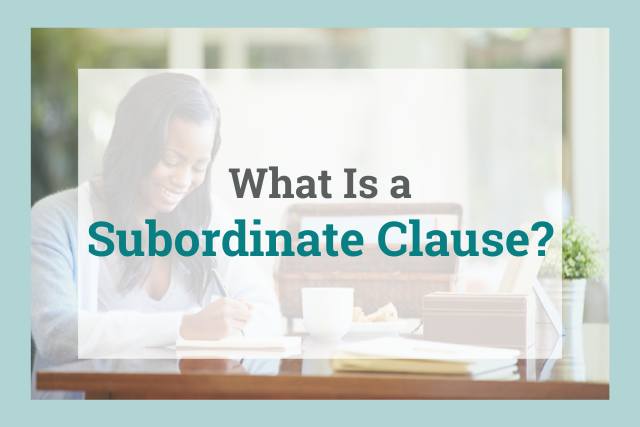
Subordinate clauses are clauses that don’t form a simple sentence on their own, and are connected to the main clause of a sentence. In a way, they’re like little kids. They can’t be left alone and, often, their words don’t really make sense. See for yourself:
Because I arrived after the monster.
Since he took all the good candy for himself.
Confused? That’s an appropriate response.
That confusion isn’t your fault—it’s just the nature of unaccompanied subordinate clauses. They contain subjects and verbs, but can’t stand on their own as complete sentences. They need help to express a complete thought. Until they get that help, these clauses won’t make much sense.
What Is a Clause?
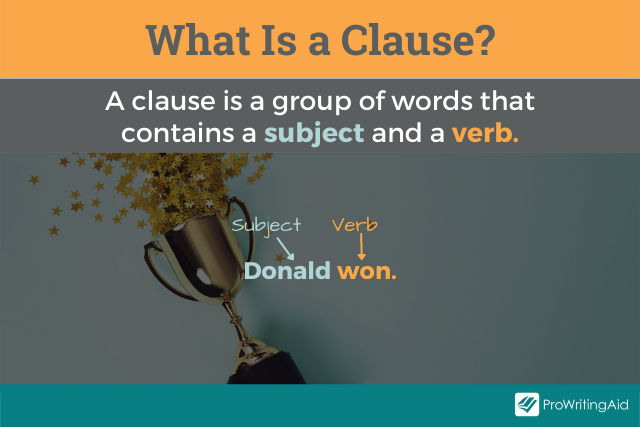
A clause is a group of words that contains a subject and a verb. There are two main categories of clauses.
You’ve already been introduced to the subordinate, also called dependent, clause. To have a full understanding of how dependent clauses work, it’s important to understand the other category: independent clauses.
An independent clause can stand alone as a simple sentence. It expresses a complete thought. A dependent clause cannot.
An independent clause has three components:
- A subject, which tells us “who” or “what” completes or performs the verb.
- A verb, which shows the action or state of being of the subject.
- A complete thought. At the end of an independent clause, you’ll know who did what or what happened.
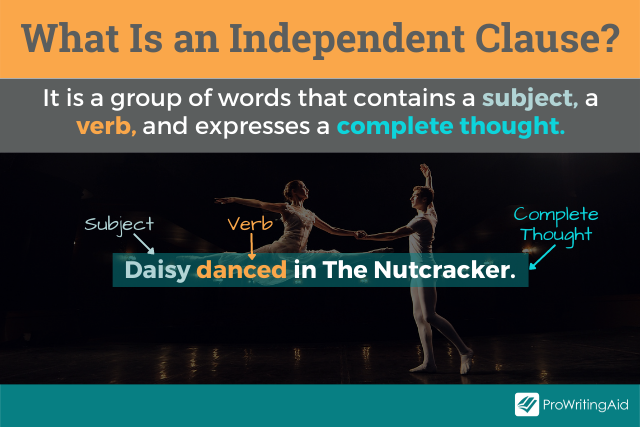
Examples of Independent Clauses
In these examples, the subjects are bold, and the verbs are highlighted.
- Joe ran the race.
- He came in third place!
- He ran against two other people.
- Joe lost.
Poor Joe—but hey, applause to him for trying! And, his loss has allowed us to observe the three components of independent clauses. Take that win, Joe!
What Is a Subordinate Clause?
Subordinate, or dependent, clauses also contain a subject and verb, but they do not express a complete thought. They cannot stand alone as sentences. Dependent clauses can only exist in complete sentences when connected to an independent clause.
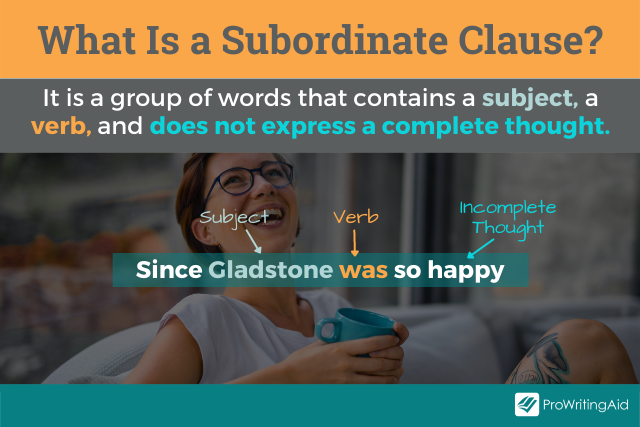
Let’s revisit those dependent clauses, in bold, from the opening of the post. This time, we’ll connect them with independent clauses and clear up the confusion they left us with.
Because I was behind the monster, all I got was old candy corn from that last house.
There wasn’t really anything left for me since he took all the good candy for himself.
See that? With a little hand-holding from independent clauses, the subordinate clause makes sense. It does its job, which is to add information to the independent clause. The dependent clause can’t stand by itself, but it does add meaning to a sentence.
How to Use Subordinate Clauses in Sentences
There are three types of subordinate clauses: adverb, noun, and adjective.
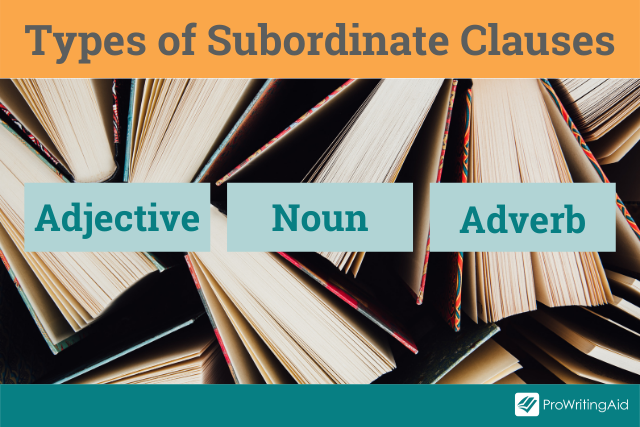
Adverb Clauses
Predictably, adverb clauses function as adverbs; they explain where, when, why, how, and to what extent, and modify verbs, adjectives, or other adverbs.
Adverb clauses begin with subordinating conjunctions, which are words that link dependent and independent clauses by establishing a relationship between the two clauses. The relationship can be based on time or place, condition, concession, cause/effect, and comparison/contrast.
Some common subordinating conjunctions are because, since, if, whenever, even if, until, while, as long as, and though.
The earlier examples of subordinate clauses, the ones about the monster situation, are adverb clauses; these adverb clauses answer “why?”
- Because I was behind the monster (explains or modifies why I didn’t get any candy)
- Since he took all the good candy for himself (explains or modifies why there wasn’t anything left)
In those examples, the dependent clause comes before the independent clause, so a comma is required after the dependent clause.
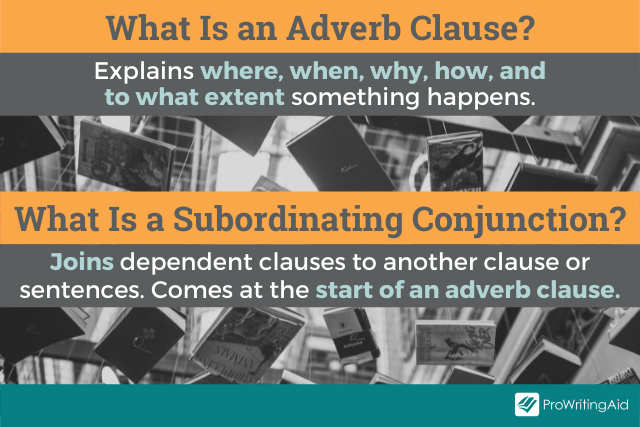
Here are a few more examples of subordinate adverb clauses. In these, the independent clause comes first, so no comma is required.
- You can go to the party as long as you come home on time.
- I lose track of time whenever I go to parties.
- Don’t lose track this time if you want to be allowed out again.
Noun Clauses
Noun clauses function as nouns, representing a person, place, thing, or idea. Noun clauses often start with how, that, or wh- words (why, who, what, whoever, etc.) They can also start with subordinating conjunctions. Noun clauses aren’t set off from the sentence with commas. For example:
Wherever you want to eat is fine with me.
In this example, “wherever you want to eat” is the subject of the sentence; it’s a noun clause representing a place.
It could be swapped out for an actual place: “Village Pizzeria is fine with me.”
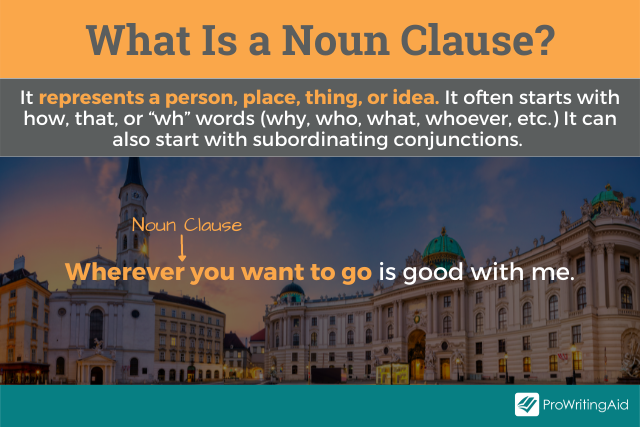
Here are a few more examples of noun clauses:
- What the best man said made the groom laugh.
- Whoever gets the role will do a wonderful job.
- Do you know how far that is?
- I don’t get what you mean.
- They now understand that lying is wrong.
Adjective Clauses
You can probably guess that adjective clauses function as adjectives. They modify nouns or pronouns and answer “which one?” or “what kind?”
Adjective clauses are also called relative clauses since they usually start with a relative pronoun. Examples of relative pronouns include that, where, when, who, whom, whose, which, and why.
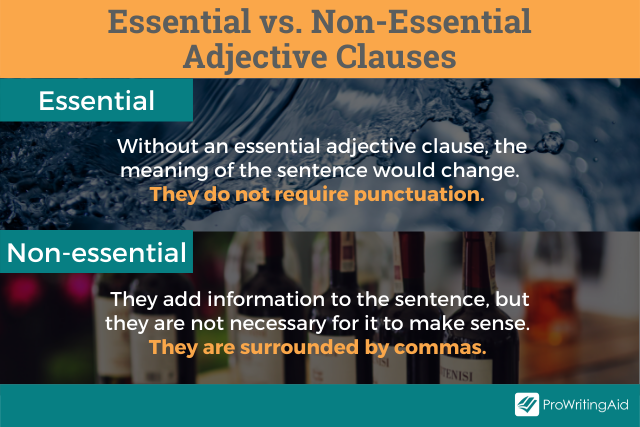
Essential and Non-Essential Adjective Clauses
Some adjective clauses are an essential, or necessary, part of a sentence. Without them, the meaning of the sentence would change. For essential clauses, no punctuation is required. For example:
- The peaches that we picked the other day have rotted.
- I don’t like people who speak unkindly about others.
If you removed the relative clauses, the meanings of their respective sentences could be unclear or would change entirely.
In the first example, the adjective clause that we picked the other day identifies which peaches the speaker is talking about. If “we” had picked some peaches and bought others from the store, that clause is essential for identifying which peaches have gone bad.
In the second example, removing the clause would leave the sentence like this: “I don’t like people.” But that’s a distortion of the speaker’s meaning. Therefore, the adjective clause is essential for conveying the sentence’s actual meaning.
Non-essential adjective clauses simply add information about the noun they modify, but their presence or absence does not change the meaning of the sentence. Non-essential clauses provide extra, but not absolutely necessary, information, and are surrounded with commas. For example:
- The student, who had done really well all semester, missed the final exam.
- The wine, which is quite expensive, is delicious.
In the first example, the point is that the student missed the exam. In the second, the point is that the wine is delicious. The subordinate clauses in each sentence simply provide additional information about the student and the wine, respectively.
FYI: Essential and non-essential clauses are also called restrictive or non-restrictive clauses.
Subordinate Clauses and Your Writing
Subordinate clauses provide opportunities to add variety to your sentence structure, and variety makes your writing more interesting, engaging, and sophisticated overall.
ProWritingAid’s Sentence Length Report shows you your sentence length variety across your document. This gives you valuable clues as to which sentence type you use most often; simple, compound, or complex.
Writing that uses the same sentence structure repeatedly can get dull very quickly. And you don't want your readers falling asleep!
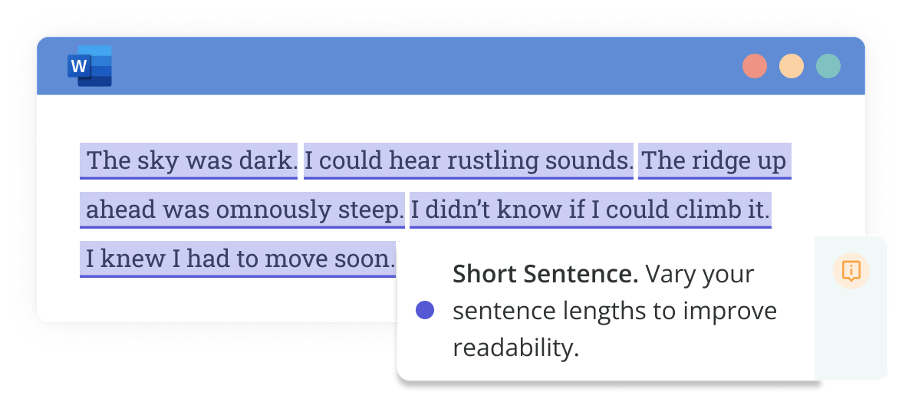
Try the Sentence Length report with a free ProWritingAid account.
This allows you to see where you may have used too many similar sentence starts and sentence structures.
But how do you fix poor variety? Thankfully, subordinate clauses can help. You can connect subordinate clauses to independent clauses in different ways to create complex or compound-complex sentences.
To create a complex sentence, connect a dependent clause (or more than one) to an independent clause. Here are a couple of examples:
- Once we get to the beach, I’ll be able to de-stress!
- When I lie down on the sand, which will be soft and warm, my muscles will relax.
To create a compound-complex sentence, connect a subordinate clause (or more than one) to two (or more) independent clauses. For example:
Though I might not go into the ocean, I’ll be soothed by the sound of the soft waves, and I’ll let those gentle sounds take the place of all the noise in my head while I lie still with my eyes closed.
Even though I have so many things to do, I know I need to take time to regroup, so I will spend a day at the beach, which will leave me refreshed and energized.
Subordinate clauses may be problematic when left on their own, but with an independent clause to help them stand, they bring interest, variety, and creativity to your work. Use them well!


